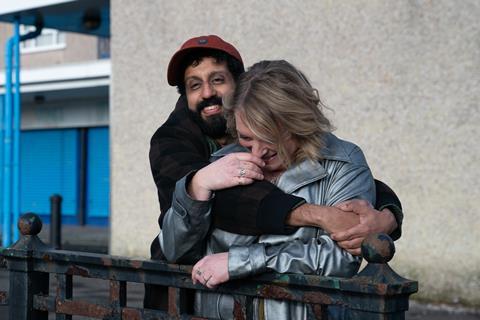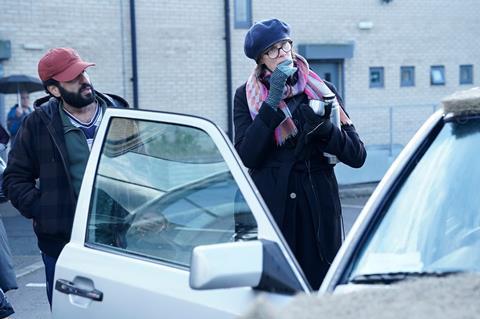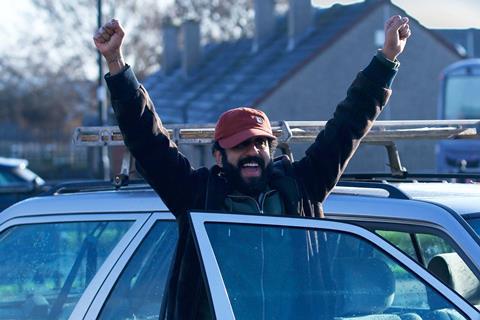Adeel Akhtar’s Bafta-nominated performance in Clio Barnard’s Ali & Ava has raised the profile of a prolific and versatile player who has spent much of the past decade in supporting roles.

Stanislavski’s old adage that there are no small parts, only small actors might well have been written for Adeel Akhtar. From Four Lions and Victoria & Abdul to recent releases such as The Electrical Life Of Louis Wain, The Nest and Everybody’s Talking About Jamie, the 41-year-old Londoner has made a habit of crafting a handful of scenes into a rich characterisation that is sometimes more memorable than the film itself.
Ali & Ava — the Cannes 2021 Directors’ Fortnight premiere in which Akhtar plays a Bradford landlord who begins an interracial romance with a woman perhaps a decade older than him — finds him afforded a rare leading role that has been duly recognised with a best actor win at the 2021 British Independent Film Awards and a nomination at the 2022 Baftas. Thanks to the organic process director Clio Barnard used to shape her contemporary love story, however, he did not feel any additional pressure.
The pair had met at Toronto International Film Festival in 2017, “and we’d had a normal chat about the films we love and the books we like reading”, Akhtar recalls. “A few months later, she got back in contact and said she had an idea for a film.”
Inspired in part by the life stories of people Barnard had met while making 2010’s The Arbor and 2013’s The Selfish Giant, the resulting drama would see Akhtar and Claire Rushbrook — no stranger herself to a secondary role — play a pair of lonely souls whose tentative relationship challenges both social norms and the rigid expectations of their respective Yorkshire families.
“Clio gave me so much space to mess around with the character,” says Akhtar, who describes former DJ Ali as “the type of person who is ordinarily overlooked”.

“If you’re a player in one of her films you have the freedom to explore,” he adds. “I can’t compare it to any other process, or any other shoot for that matter. The whole thing was like nothing I had done before and I was upset when it finished.”
Akhtar has experience of flouting expectations, which in his case involved following his father and grandfather into the legal profession. “When I left [Cheltenham College], I wanted to go to drama school but my dad said I couldn’t,” he says. “I came from a traditional Asian background and he was the rule-maker so I had to listen. I did a law degree and I was sad doing it. It’s all about retaining and regurgitating information, and I just don’t have the brain for it.”
Finding his path
An escape option presented itself when Akhtar’s then-girlfriend earned an audition for the Actors Studio in New York and asked him to accompany her as her scene partner. The flight across the Atlantic was an eventful one that ended with him taken off the aeroplane in handcuffs as a suspected terrorist. “It was almost like a film,” he remembers, calmly. “As the plane landed it taxied to a secluded part of the runway where these big black vans were waiting with the FBI lot inside.” A galling case of racial profiling was eventually resolved, leaving Akhtar with an acute awareness of the knife’s edge on which certain lives are balanced.
“Looking back, it has maybe informed some of the stuff I respond to,” he reflects. “There are people in this world who don’t have a safety net, and I’m drawn to stories that try to shed light on that.” That Akhtar would eventually be offered a place at the Actors Studio himself adds a positive coda to the episode. It is both ironic and telling, however, that his first time on screen, in 2002 docudrama Let’s Roll: The Story Of Flight 93, would see him play a 9/11 hijacker.
Chris Morris’s Four Lions (2010) offered Akhtar another terrorist, in bumbling jihadist Faisal, a zealot so hapless he is blown up by his own IED. The Bafta-winning farce would be a breakout vehicle not just for Akhtar but also for co-stars Riz Ahmed and Kayvan Novak. “The pinpoint accuracy with which Chris told that story was just perfect,” Akhtar says. “I remember being in a Bradford cinema with an audience of young Asian men all saying, ‘That’s me’ — and it was made by this geeky white fella.”
Channel 4’s Utopia gifted Akhtar another striking role in conspiracy theorist Wilson Wilson, which saw him nominated for a Bafta TV award in 2015. Two years later he won that prize, becoming the first non-white actor to be crowned best TV actor for the BBC’s Murdered By My Father. Since then Akhtar has been a consistent TV presence thanks to parts in The Night Manager, sitcom Back To Life and BBC Studios’ 2018 adaptation of Les Misérables. Roles in Enola Holmes, Murder Mystery and Sweet Tooth, meanwhile, have made him a staple on Netflix — and it is while shooting season two of the latter fantasy TV series, in New Zealand, that the actor is speaking to Screen International.

That leading roles have remained infrequent so far does not give him pause. “Whether it’s a big part or a small part with two lines, it carries the same weight,” he declares. “I’m so appreciative of people hiring me. I don’t take it for granted.” Nor does he feel so confident in his abilities as to resent feedback, self-deprecatingly recalling some sage advice director Stephen Frears gave him on his first day filming Victoria & Abdul.
“I knew I was the comedic relief in it, so I really went for the comedy,” he says of that 2017 period piece, in which he played an Indian manservant reluctantly dispatched to attend Judi Dench’s ailing monarch. “On the first day we had to carry some furniture across a windy hill and I was just eating up the set. Stephen came up and gently said I should, ‘Bring it down.’ It was a good bit of direction from him — to not signal the humour, but just let it happen.”
As adept at serious drama as he is with broad comedy, Akhtar knows his ethnic origin — his Pakistani father met his Kenyan mother while working at Heathrow airport — makes him “the exception rather than the rule” in his chosen profession. That his job has led him to be up for a Bafta Film Award with the likes of Will Smith and Leonardo DiCaprio is “a very surreal feeling”.
“It sounds like the start of a joke: ‘Leo, Will and Adeel are all nominated for a Bafta,’” he observes wryly. “But it’s one of those ones where we have to wait for the punchline.”

























No comments yet